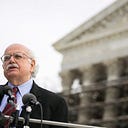Pass H.R. 1 and H.R. 4 to Protect the Vote
As Republicans continue to assail the right to vote by passing voter suppression laws in state legislatures around the country, there are two essential bills in Congress that will protect the freedom of every eligible citizen to vote in federal elections.
It is important to understand the different purposes they serve.
H.R. 1, the For the People Act, is sweeping democracy reform legislation that contains reforms to protect the sacred right of every eligible citizen to vote and solutions to prevent Washington political money corruption. The House passed the bill in 2019 and again this year. S. 1, the Senate companion measure, is pending in the Senate.
This bill incorporates the Voter Empowerment Act, first introduced in 2012 by the late voting rights icon, Representative John Lewis, and reintroduced by Rep. Lewis in four successive Congresses until his death in 2020.
These provisions would set fair, national standards for voting access and procedures in federal elections, and would also supersede the voter suppression laws being enacted by state legislatures, as the Constitution gives Congress the ultimate power to establish voting rules for conducting federal elections.
A Supreme Court decision in Arizona v. Inter Tribal Council of Arizona, (2013) written by Justice Antonin Scalia, reaffirmed this, stating:
The power of Congress over the ‘Times, Places, and Manner’ of congressional elections ‘is paramount, and may be exercised at any time, and … the regulations effected supersede those of the State which are inconsistent therewith.’
The second bill — the Voting Rights Advancement Act, H.R. 4 — was first introduced in 2015 by Rep. Terri Sewell (D-AL) and reintroduced in the two succeeding Congresses. The House passed the bill in 2019 and in 2020 the bill was renamed the John R. Lewis Voting Rights Act to honor Representative Lewis after his passing.
The bill will be reintroduced this year following congressional hearings now taking place to build a record on racial discrimination in elections.
This bill restores and strengthens requirements in the Voting Rights Act of 1965 that certain states and political subdivisions get preclearance from the Justice Department or the U.S. District Court for the District of Columbia for any changes they want to make in their voting laws.
The formula used to determine which states and political subdivisions are subject to preclearance requirements was struck down in 2013 by the Supreme Court in Shelby County v. Holder.
Unlike the voting rights provisions in H.R. 1, the preclearance provisions in H.R. 4 will only apply to changes in state voting laws pursued after H.R. 4 becomes law. The Act’s preclearance requirements will also apply to certain practices nationwide that disproportionately affect communities of color.
Thus, only H.R. 1 will override the state voting restriction laws already enacted or that will be enacted prior to the passage of H.R. 4. This would include the wave of new state laws coming this year from Republican legislatures that are creating the greatest voter suppression and disenfranchisement in federal elections since the days of Jim Crow.
It is incumbent on Congress to enact both the For the People Act (H.R. 1/S. 1) and the Voting Rights Advancement Act (H.R. 4) to ensure that every citizen in America eligible to vote is able to vote.
